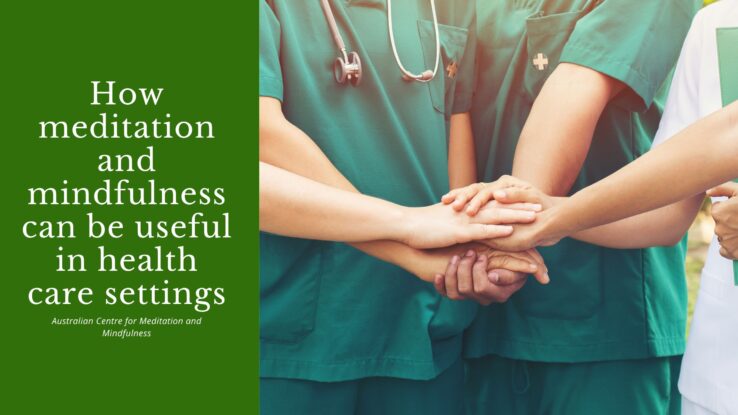5 Ways Meditation and Mindfulness Can Be Useful in Health Care Settings
Having spent over 40 years working as a registered general nurse, midwife, maternal and child health nurse, in a number of different facilities – acute care, emergency care, intensive care – both adult and neo natal, schools, in community health centres and home visiting; I can say I have seen the best and the worst of both the health care system and those we serve. It’s fair to say that people who are unwell, scared or injured, along with those working under sometimes intolerable conditions, are really pushed to the limits of their personal coping strategies. This can result in negative experiences and outcomes for those under this type of stress. Thankfully, in recent years, strategies are being employed to help all those in this scenario enjoy improved outcomes. One of those, is the use of mindfulness practices and programs in some facilities.
Who benefits specifically and how?

Meditation and mindfulness can provide benefit to hospital care staff
- Let’s start with the staff.
Nurses, doctors, allied health staff, administrative staff, hospitality staff, and even hospital volunteers. They can all benefit from learning some simple skills in mindfulness.
As we now know through many studies, mindfulness has been shown to help prevent, alleviate and manage stress, anxiety, depression, burnout and insomnia (just to name a few!). Having an enhanced knowledge of our own bodies and minds through being able to create an inward focus, we are better able to objectively detect our body’s signals of stress and burnout, helping us to know when we need to start to tip the scales in order to better manage our own stress levels, and rest or take action.
Finding ways to create a more sustainable work – life – fun balance can be a spin-off from mindfulness practices.
With a regular meditation practice in place, even our physical health benefits – with a stronger immune system, improved cardio-vascular health, lower blood-pressure and stress scores. Even some auto-immune diseases improve with regular meditation practice.
2. With a happier and healthier workforce – who else benefits? You guessed it – the patients!!
In the scenario of a super busy hospital department or residential facility – it is all too common to feel your :
- stress levels,
- blood pressure
- and panic rising alarmingly.
This is contagious, and soon, those around you feel their stress levels rising too.
Enter someone who has some skills in remaining calm, through dipping into their para-sympathetic nervous system, using some deep breathing and grounding skills, and the balance starts to tip in a more favourable direction. This too can be contagious – reassuring to other staff and to patients, family and residents alike. The climate and culture can start to change.
Other ways to use Mindfulness in a Health Care Setting

A more mindful and happier health care workforce
3. Mindful Communication
Looking at the benefits in a one-on-one setting, using mindful communication skills – e.g. active listening (and hearing) using eye contact, a hand on the patient’s or relative’s hand, and using reflective listening skills to express your understanding and to validate the information shared will go miles in reassuring and comforting the scared and worried people in your care.
Being able to ground yourself before sharing difficult news with someone will help you to be with them in a compassionate way– knowing it is their journey which you are helping them to travel in the best way possible.
4. Easing Chronic Pain
Chronic pain is an area that has undergone an enormous amount of study when it comes to mindfulness practices. Learning skills to help yourself and your patients reframe how they experience and be with pain can help to reduce needs for increasing medications. In some cases, surgeries have been cancelled after a 6 week program of mindfulness for managing chronic pain brought about noticeable results.
4. Palliative Care
Working with patients facing end of life is a huge area where meditation and mindfulness can create a completely different journey for the patient and the supporting family and friends – enhancing quality of life and relationships – even finding the opportunity for emotional healing of long held emotional trauma. Helping the family to be with their loved one in the best way possible for all concerned can make this difficult time a gift for all.
5. Improving patient/practitioner relationship and outcomes
Results for patients improve when their relationship with their practitioner is a good one. Mindfulness enables practitioners to be more compassionate with their patients, thereby improving the relationship, and it is also a great tool to support practitioners with their own self care.
Mindfulness; a tool that has many applications and benefits in healthcare
So as you can see meditation and mindfulness have many benefits for health care professionals and patients alike.
For health care professionals, mindfulness can help:
- reduce stress,
- improve focus,
- and increase energy levels so they are better equipped to handle the demands of their work.
For patients, mindfulness can help:
- reduce their symptoms of pain,
- ease depression,
- calm anxiety
- as well as improve their quality of life.
Author – Susie McPhie, ACMM Coach
At ACMM, we offer Certificate, Advanced Certificate, and Diploma Training Options, with optional Business Development Support alongside and after your training.
Find out if our courses are the right fit for you. Book a Zoom Discovery Call with us today!




